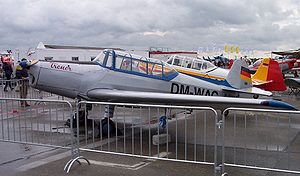| This article needs additional citations for verification. Please help improve this article by adding citations to reliable sources. Unsourced material may be challenged and removed. Find sources: "Zlín Z-26" – news · newspapers · books · scholar · JSTOR (August 2008) (Learn how and when to remove this message) |
| Trener | |
|---|---|
 Z-126 Trener II Z-126 Trener II | |
| General information | |
| Type | Training aircraft |
| Manufacturer | Moravan Otrokovice |
| History | |
| Manufactured | 1948–1977 |
The Zlin Z-26 Trener was a tandem-seat basic training aircraft built by the Czechoslovakian company Moravan. A low-wing monoplane of largely wooden construction, it was developed into a series of all-metal trainers. Several were also produced in aerobatic variants, known as the Akrobat.
The original Z-26 was designed in the 1940s and produced in 1946 to meet a requirement for a basic trainer to replace the Bücker Jungmann and Bestmann. It was a low-wing monoplane of mixed construction, with wooden wings and a welded metal tube fuselage, powered by a single four-cylinder piston engine, the Walter Minor 4-III. It first flew in early 1947, proving superior to the competing Praga 112, and was declared the winner, entering production in 1948.
Later derivatives were also optimised to participate in aerobatic competitions and many were owned by private pilot owners. Both the two-seat Trener and the single-seat Akrobat were considered highly successful, winning several aerobatic awards in the 1960s.
Variants

The following variants were progressive improvements on the Z-26:
- Z-26 – two-seat primary trainer aircraft. 163 built.
- Z-126 – introduced in 1953, Czech military designation C-105, all-metal wing instead of original wooden wing.
- Z-226 – more powerful Walter Minor 6-III six-cylinder engine, C-205
- Z-226A – single-seat aerobatic aircraft. This and subsequent single-seat variants were named the Akrobat.
- Z-226B – glider tug aircraft
- Z-226T – basic training version
- Z-326 – Introduced in 1959, with an electrically retractable undercarriage (standard on future models)
- C-305 – military version of Z-326 with night-flight capability and military-class cockpit equipment
- Z-526 – with the Walter 6-III carburettor's six-cylinder engine
- Z-526A – single-seat aerobatic aircraft
- Z-526F – Improved version. M-137 engine with fuel injector.
- Z-726 – modified 526 with shortened wings and fuselage
- Z-726K – with Walter M 337 supercharged engine
In 1956, deliveries began of the Z326 Trener-Master and Z326A Akrobat. Many sub-variants were also produced, for example the Z-526A and Z-526AFS were aerobatic specials. The production of the family was terminated in the 1970s with Z-726. The Z-726 Universal had reduced wingspan.
Operators
Military operators
 Austria
Austria- Austrian Air Force
 Cuba
Cuba- Cuban Revolutionary Air and Air Defense Force - received about 60 Z-226, Z-326 and Z-526s in the 1960s.
 Czechoslovakia
Czechoslovakia- Czechoslovakian Air Force
 East Germany
East Germany- Air Forces of the National People's Army
 Egypt
Egypt Iraq
Iraq Mozambique
Mozambique Yemen
Yemen
Specifications (Z-726)
Data from Jane's All The World's Aircraft 1976–77
General characteristics
- Crew: two
- Length: 7.975 m (26 ft 2 in)
- Wingspan: 9.875 m (32 ft 5 in)
- Height: 2.06 m (6 ft 9 in)
- Wing area: 14.89 m (160.3 sq ft)
- Airfoil: root:NACA 2418; tip:NACA 4412
- Empty weight: 700 kg (1,543 lb)
- Max takeoff weight: 1,000 kg (2,205 lb)
- Powerplant: 1 × Avia M 137AZ 6-cyl, air-cooled inverted in-line piston engine, 134 kW (180 hp)
Performance
- Maximum speed: 236 km/h (147 mph, 127 kn)
- Cruise speed: 216 km/h (134 mph, 117 kn)
- Stall speed: 98 km/h (61 mph, 53 kn) (flaps down)
- Range: 440 km (270 mi, 240 nmi)
- Service ceiling: 4,500 m (14,800 ft)
- Rate of climb: 5 m/s (980 ft/min)
See also
References
- Mourik 2001, p.61.
- ^ Frawley 1997, p.198.
- Taylor 1989, p.908.
- William Greene; The Observer's World Aircraft Directory, Warne, 1961, pp. 318, 334.
- Hagedorn 1993, p. 29.
- Mourik 2001, p.64.
- Taylor 1976, pp. 33–34.
- Frawley, Gerard. The International Directory of Civil Aircraft. Aerospace Publications Pty Ltd, 1997 ISBN 1-875671-26-9
- Hagedorn, Daniel P. Central American and Caribbean Air Forces. Tonbridge, Kent, UK: Air-Britain (Historians) Ltd., 1993. ISBN 0-85130-210-6.
- Mourik, Dick van. "A to Zlin: An Illustrated History of a Light Aircraft Dynasty". Air Enthusiast, No. 93, May/June 2001. Stamford, UK:Key Publishing. ISSN 0143-5450. pp. 59–65.
- Taylor, John W R. (editor). Jane's All The World's Aircraft 1976–77. London: Jane's Yearbooks, 1976. ISBN 0 354 00538 3.
- Taylor, Michael J.H. (editor). Jane's Encyclopedia of Aviation. London:Bracken Books, 1989. ISBN 1 85170 324 1.
External links
![]() Media related to Zlín Z-26 at Wikimedia Commons
Media related to Zlín Z-26 at Wikimedia Commons
| Aircraft produced by Zlín and Moravan | |
|---|---|
| Manufacturer designations |
|
| By name | |
| Unknown/not assigned | |
| Czechoslovak Air Force trainer aircraft designations, 1945–1958 | |
|---|---|
| Trainer (Cvičný) | |
| Bomber Trainer (Cvičný Bombardovací) | |
| Liaison Trainer (Cvičný Kurýři) | |
| Fighter Trainer (Cvičný Stíhací) | |
| Post-1962 Yugoslav/Serbian Air Force and Air Defence aircraft designations | |
|---|---|
| Lovac (Fighter) | |
| Jurinik (Attack) | |
| Helikopter (Helicopter) | |
| Visenamenski (Utility) | |
| Nastavni (Trainer) | |
| Transportni (Transport) | |
| Unofficial | |